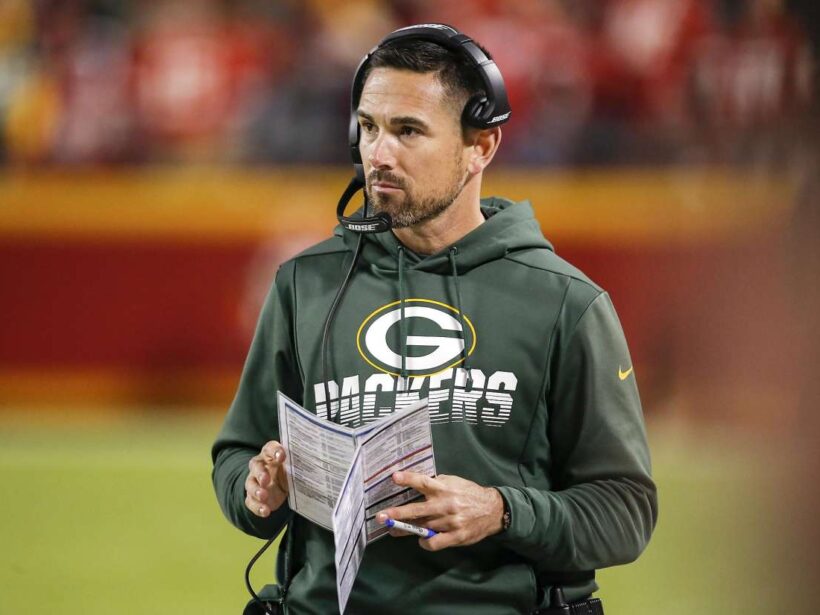It made sense at the time. Packers deferring Kickoffs came about as they were walking into the literal Lions’ den on Thanksgiving Day. Matt LaFleur decided to go against type and conventional wisdom. The Packers won the coin toss and chose to receive instead of deferring the kickoff option to the second half.
The decision paid off. Following an opening play bomb to Christian Watson, the Packers scored on their first drive and went on to pull the upset. The following week seemed to offer proof of concept. Kansas City won the coin toss and deferred, giving the Packers the ball first. Again, the Packers scored a touchdown on their opening drive and went on to upset the eventual Super Bowl champions.
The strategy again paid off handsomely in the playoffs. Against Dallas, the Packers won the toss, chose to receive, scored an opening drive touchdown, and never looked back in a rout of the Cowboys. In the Divisional round, the Packers likewise won the toss, elected to receive, and opened the scoring with a field goal on their first drive. The fact that they would eventually lose to the 49ers had more to do with Anders Carlson’s missed field goal and Jordan Love throwing two 4th quarter interceptions than the Packers having the ball first.
Deferring the choice to receive the opening kickoff to the second half is the default choice for two reasons. First, and most recited amongst television commentators is the ability to “double-up” possessions. If you end up having the final drive of the half, you get the ball first in the second half and get back-to-back possessions. Scoring on both those drives is obviously a significant advantage in the outcome of the game.
The second, less recited reason deferring makes sense is akin to having home-field advantage in baseball. It doesn’t necessarily mean that you’ll have the ball last, but it does ensure that you will have at least as many possessions as your opponent in the all-important second half of the game and means there is the possibility you could get one more possession in the half.
The 2023 Packers were uniquely suited to go against the consensus and receive the opening kickoff. Their offense was deliberate and the defense was allergic to creating turnovers. The Packers offense ranked 3rd overall in 3rd down conversion rate. The defense ranked 28th in 3rd down conversion rate allowed. The Packers and their opponents had a lot of long drives and limited total possessions. The Kansas City game famously saw the two teams combine for only five total possessions in the first half. In a low-possession environment, having the ball first can be an advantage if you regularly score on the first possession.
The 2024 Packers are a different team than their 2023 predecessors. Their 3rd down conversion rates have dropped from the high-40s on offense and low-40s on defense to 36% on both sides of the ball. Additionally, the Packers’ games have seen an increase of more than one turnover per game this year. They’ve gone from 2.1 turnovers per game in 2023, to 3.3 in 2024). This leads to a higher-possession environment where you would prefer to have the opportunity to both double up at the half and have the ball last.
Through ten games this season, the Packers have won 5 of the 10 opening coin flips. They’ve elected to receive the opening kickoff in four of those five games and deferred once (vs. Minnesota). The Packers’ opponents have elected to defer in the five games they’ve won the coin toss. Combined, the Packers have had the ball first in nine of their ten games.
In those nine games, the Packers have scored 20 points on their opening drives. Their opponents have similarly scored 20 points in their nine drives to open the 2nd half. Advantage: none. Opponents have had four “double-up” opportunities. They’ve scored in their final possession of the first half in all four, totaling 16 points. Philadelphia and Chicago have successfully pulled off the double-up by scoring on their opening possession of the 2nd half, as well.
Having the ball first in nine of the first ten games certainly hasn’t been a disadvantage for the Packers. They have a net 4-point disadvantage in the opening and closing drives of the 20 halves of football they’ve played so far. Over a ten-game sample, that’s pretty meaningless. If you’re going against conventional wisdom in your decision-making process though, you should see some advantage from it. Since they’re not, it’s probably time for Matt LaFleur to abandon the experiment and go back to deferring when winning the coin flip.

